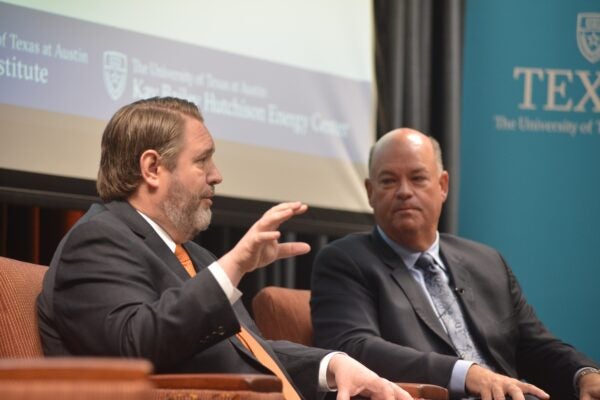Fully 4% of employees at oil and gas giant ConocoPhillips are UT Austin graduates.
So it seemed only natural that during Energy Week — a conference hosted by UT’s Energy Institute bringing together students, faculty members, entrepreneurs and industry leaders — Ryan Lance, the corporation’s CEO since 2012 (when he took the reins from UT alumnus Jim Mulva) found himself in conversation with UT’s interim president, Jim Davis.
A 40-year energy veteran from Montana who began roughnecking during high school in the Powder River Basin, Lance emphasized the value of student internships in the oil industry. “Take advantage of all those, figure out what your passion is and figure out what you like about it. We have a responsibility to offer those internships. We get to look at kids who have the passion and want to be in the business, and it gives students the opportunity to learn about pieces and parts of the business they like or don’t like. I took advantage of it, and I encourage your students to also.”
Davis said, “Here at the University, we think about energy broadly. We take an all-of-the-above approach, all forms, all types.” He asked Lance to describe the different roles of fossil fuels and alternative fuels and how he sees those roles changing over time.
“The answer obviously is all of the above,” Lance said. “You look at the world’s growth — there are a billion and a half people who have what I have, which is the lights come on, air conditioning comes on in the summer, heat comes on in the winter. There are 6 billion people, growing to 8 billion people, who don’t have what I have. Getting energy security, affordability and reliability is so important, and it doesn’t matter where it comes from.”
Lance says renewable energy is good, but it needs to be on top of base-load power. Renewables work 30-35% of the time. “That means two-thirds of the time it’s not working,” he said. The base load currently comes from natural gas, oil, coal, and nuclear. “So it really is an all-of-the-above equation.”

He sees three primary sustainability issues in the oil and gas business: methane leaks, flaring, and orphaned wells — wells that were drilled decades ago and haven’t been “properly abandoned.” “That’s all eminently engineerable. There are fixes to that.”
The looming problem in Texas and the rest of the United States, he said, is electricity. “In Texas, we have a power problem. Our peak load in Texas in the summer is the equivalent of California and New York combined. And by 2030, we have to add the equivalent of another California. We’re all trying to electrify. The vehicle system is electrifying in the U.S.”
Much of this projected shortfall is attributable to power-hungry artificial intelligence. Lance predicts AI will be bigger than the internet and mobile devices combined. And as with any revolution, it presents challenges. “Universities have to be thinking about how to get kids coming up now trained. How do you get them educated? Not everybody is going to be a coder, but you have to get the use cases and understand how to work a whole lot smarter.” Lance doesn’t foresee AI replacing his employees but rather making them more effective.
Davis added that the questions AI has raised at UT revolve around how to harness this tool. “How do we have our students learn how to incorporate that across all sectors? I’ve met several hundred students in this first six weeks [since being named interim president], and it’s amazing to me to see their drive — students who want to have an impact on lives come to the University to learn something, do something with that learning, to change the world, to transform lives — the core missions of the University.”
Davis recalled a recent meeting with UT’s student body president and vice president. “I was reminding them that when I was younger than they are, we had to learn what a computer was. I had a BASIC coding class when I was at O. Henry Middle School here in Austin back in the early ’80s.”
Now, even though students are native users of technology and seemingly adapt instantly to change, “they have the same insight” that Lance described with internships. Davis said, “We have a student body president and vice president asking, how can we help our students get out of the classroom and do other things as well, get life experience and a fuller set of skills and traits that help make them quality people and creative thinkers? And of course both of them are triple majors. The students I have met here are just incredibly talented and gifted and eager to make a big change in the world and to have a long, fulfilling career. I’m grateful that your company is part of that journey,” Davis told Lance.
Lance called UT “an important institution, not only for our company but for Texas and for our country. You’re educating future leaders which is critical.”




